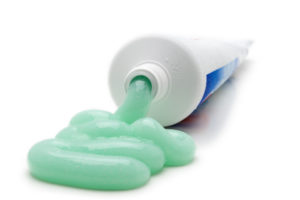 We as humans have been using toothpaste for centuries. There is evidence that the Egyptians created a special formula to clean teeth in 4 AD. You would think that this timeline has given us ample opportunity to perfect the product. That said, why can the toothpaste section be so daunting? Is there one toothpaste that is perfect for every scenario? At Ponte Vedra Complete Dentistry, we are committed to educating all within reach about oral healthcare issues. We hope you learn something! We welcome questions, comments, and new patients.
We as humans have been using toothpaste for centuries. There is evidence that the Egyptians created a special formula to clean teeth in 4 AD. You would think that this timeline has given us ample opportunity to perfect the product. That said, why can the toothpaste section be so daunting? Is there one toothpaste that is perfect for every scenario? At Ponte Vedra Complete Dentistry, we are committed to educating all within reach about oral healthcare issues. We hope you learn something! We welcome questions, comments, and new patients.
What is in Toothpaste?
Below is a bullet list of the ingredients typically found in toothpaste.
- Mild Abrasives – these are used to remove debris and stains. These include calcium carbonate, silica gels, aluminum oxides, etc.
- Fluoride – strengthens enamel, remineralizes decay. Sodium fluoride 1100ppm most common. There are variations of the formulas that deliver the fluoride (stannous fluoride, sodium fluoride, etc.)
- Humectants – prevent water loss
- Flavoring agents
- Thickening agents or binders – stabilize formula
- Detergents – create foaming action similar to a lather created from soap
Also commonly found in toothpastes are sensitivity reducing agents, agents that reduce the presence of gum disease, surface stain removers, and agents that minimize bad breath. That is a lot of ingredients. No wonder there is so much variation in formula.
Is Toothpaste Bad For You?
You may have seen the news reports in recent years about many of the ingredients in toothpaste and why each are bad for your health. The news has said that triclosan is an endocrine disruptor, fluoride can cause permanent tooth discoloration, and Crest toothpaste embeds plastic into our gums. Is all of this true?
The detailed scientific evidence regarding this discussion will be saved for another blog but here is a little clarification. The FDA says that triclosan is not known to be hazardous to humans and in 1997 claimed that “the evidence showed that triclosan in this product was effective in preventing gingivitis.” Fluoride in water has been said by the CDC to be one of the 10 greatest achievements in public health of the 20th century. Many studies have looked at different ingredients in toothpaste and their potential toxicity. Although many of the results of these studies show caustic and dangerous results, it is important to note that the levels of these chemicals required to cause damage of any significance to humans are orders of magnitude higher than what can be obtained from normal brushing. The FDA, CDC, and many other organizations do not have enough evidence that the levels of exposure are sufficiently dangerous in toothpastes to ban them. All this said, it is important to avoid unnecessary ingestion of toothpaste. We will continue to post on this topic as the argument unfolds.
What About Sensitive Teeth?
There are a number of different reasons that teeth can be excessively sensitive. If the pain exists in the gum tissues, you should see your dentist regarding the possibility of gum disease. If it is in the teeth; however, there are some toothpastes that can help. Colgate Pro Relief and Sensodyne are two of the more well known products. They work in part by blocking sensitive tooth structure, replenishing minerals, and depolarizing nerve signals. If you have extremely sensitive teeth, we recommend having the dentist determine the source and possibly prescribing products with stronger formulas. That said, these products have been shown to be effective in multiple studies.
Are Toothpastes Excessively Abrasive?
It has been brought up in the past in the news that excessive tooth damage can be caused by toothpastes. This idea does have some merit. Toothpastes are ranked by a relative dentin abrasion index (RDA). The abrasives added to toothpaste have been shown to have the ability to create progressive tooth damage. Patients with exposed root surfaces from recession are most at risk for this. Among the major brands of toothpaste on the market, the product with the lowest RDA is the Arm & Hammer line of toothpastes. If you have exposed root surface or are experiencing signs of tooth structure loss due to brushing, we recommend that you switch to this product. In addition, if you are in this category we advise against whitening toothpastes because they are some of the more abrasive on the market.
What About Children?
If you would like to read extensively into the oral healthcare for children, click here to visit our past blog segment on “Oral Healthcare for Children”
If you have any questions, comments, or would like to schedule a consultation at any time, feel free to contact us electronically or call (904)285-7711.



